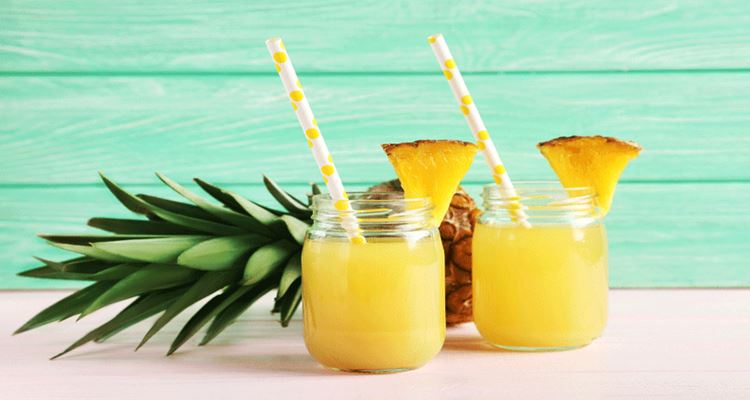These are the health benefits of drinking pineapple juice and how to make a fresh one.
PINEAPPLE JUICE – Tropical fruit pineapple is filled with vitamins and minerals and here are the benefits of drinking its juice.
Refreshingly sweet and tangy is a pineapple juice made out of fresh and natural pineapples. Everyone can’t probably let a summer pass without sipping their glass of this juice sweating in cold decorated with a pretty umbrella on top.

In a previous post, among the health benefits of pineapples include boosting energy. hydrating the body, improving blood circulation, and increasing immunity. A cup of this fruit is fat-free, cholesterol-free, and low in sodium. It is recommended that one must consume just one cup each day which contains 74 calories.
It is rich in vitamins, enzymes, and antioxidants. It also has thiamin that improves energy production.
A cup contains the following:
- Calories: 74
- Total Fat: 0 g
- Cholesterol: 0 mg
- Sodium: 2 mg
- Potassium: 206 mg
- Total Carbohydrate: 19.5 g
- Sugars: 13.7 g
- Protein: 1g
- Vitamin C: 28 mg
- Calcium: 21 mg

What about the juice? The best way is consuming it fresh. Its canned counterpart is not highly recommended because it lacks the main health benefits coming from the high quantity of minerals, fibers, enzymes, vitamin C and energy of the fruit.
Here are some steps in making a fine fresh juice from pineapple:
- Slice the ripe flesh to chunks and put in a blender.
- Pour 1/2 cup of water.
- You may also put some added kicks and flavorings such as a pinch of ground black pepper, sugar, and salt. All of these are optional.
- Blend until you achieve a smooth and liquidy consistency. Make sure there are now chunks left.
- Strain to get rid of pulp.
- Add ice cubes then serve.
According to USDA, 250 grams of this (canned or bottled, unsweetened, with added ascorbic acid), has the following:
- Calories: 132
- Protein: less than 1 gram
- Fat: less than 1 gram
- Carbs: 33 grams
- Sugars: 25 grams
- Fiber: less than 1 gram
- Manganese: 55% of the Daily Value (DV)
- Copper: 19% of the DV
- Vitamin B6: 15% of the DV
- Vitamin C: 100% of the DV
- Thiamine: 12% of the DV
- Folate: 11% of the DV
- Potassium: 7% of the DV
- Magnesium: 7% of the DV
It also contains pretty amounts of manganese, copper, and vitamins B6 and C and traces of iron, calcium, phosphorus, zinc, choline, and vitamin K.
Meanwhile, there’s one downside to this. Its acidity may trigger heartburn or reflux in some people especially those with gastroesophageal reflux disease (GERD). In some cases, it may also promote weight gain if consumed excessively because it is low in fiber yet high in sugar.
READ ALSO:
- Egg Calories – Amount Of Calories Based On How It Is Cooked
- Calorie Deficit – What Are The Things You Need To Understand
What can you say about this? Let us know!

